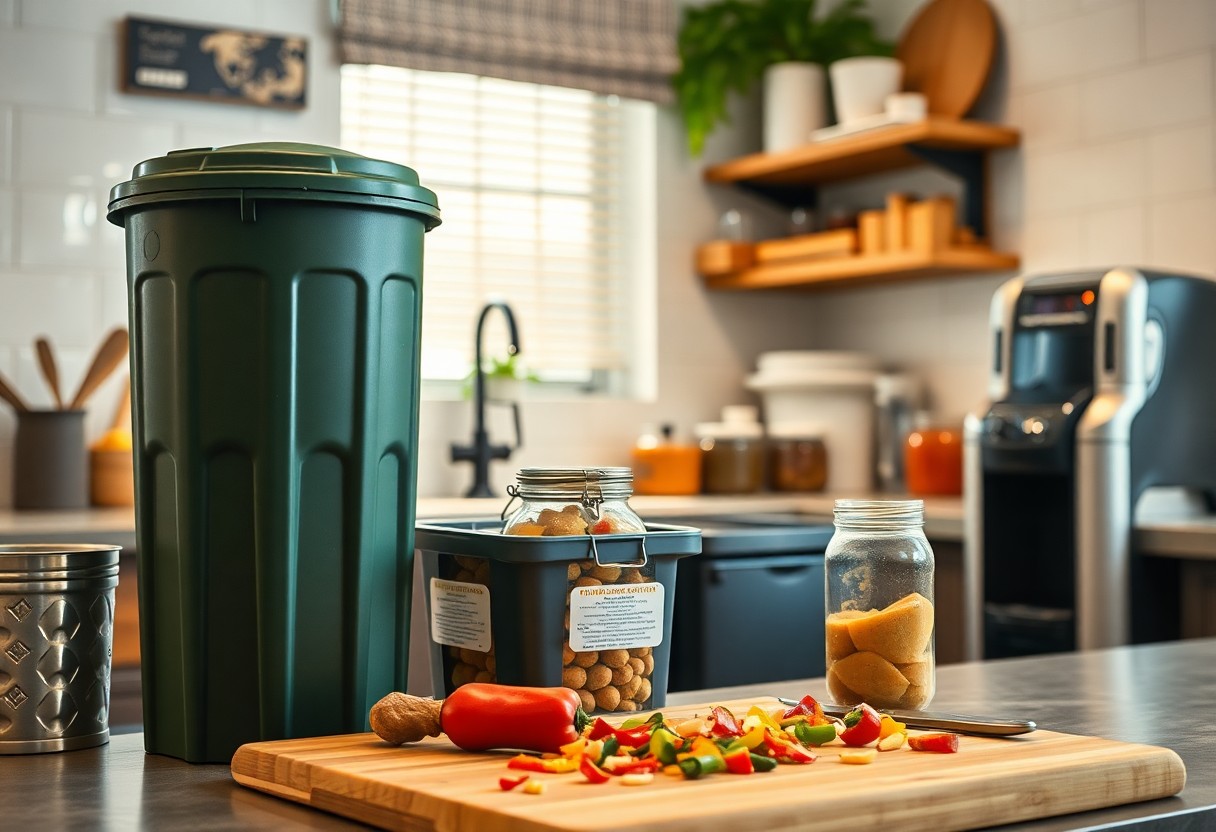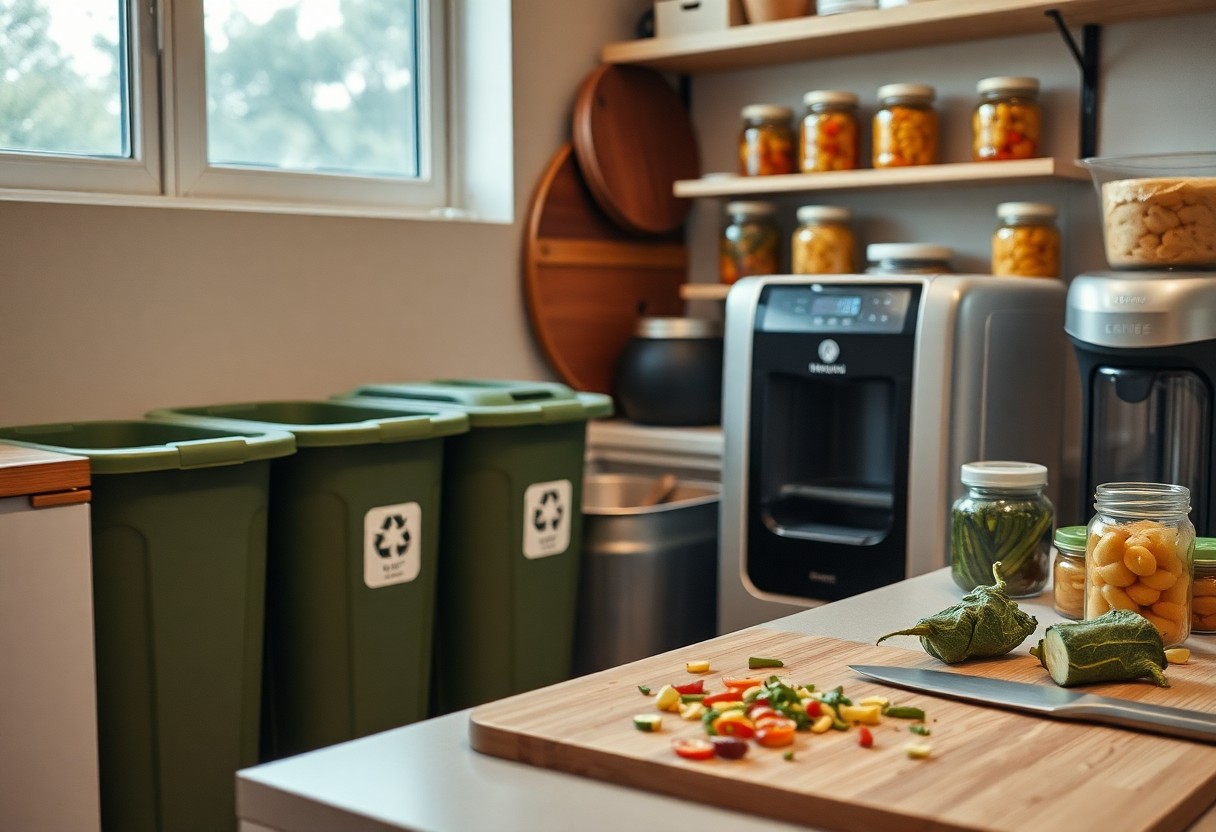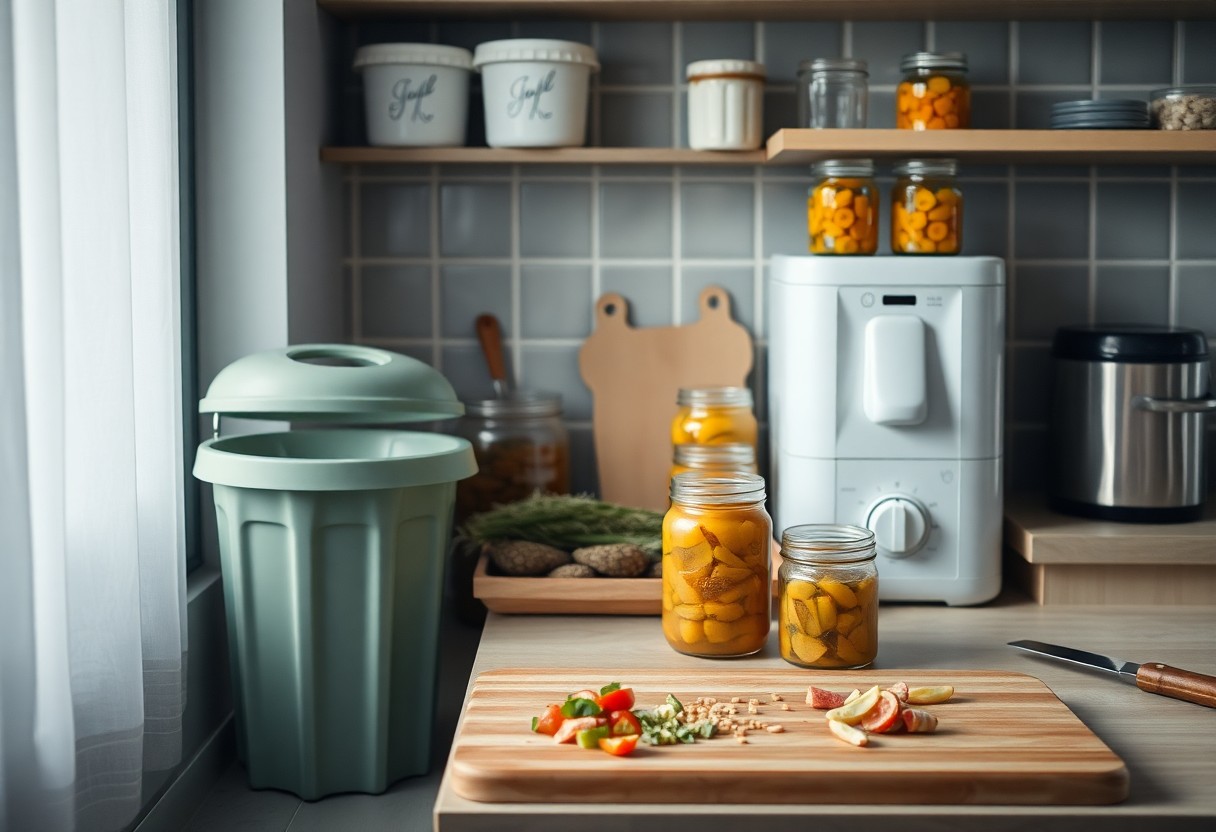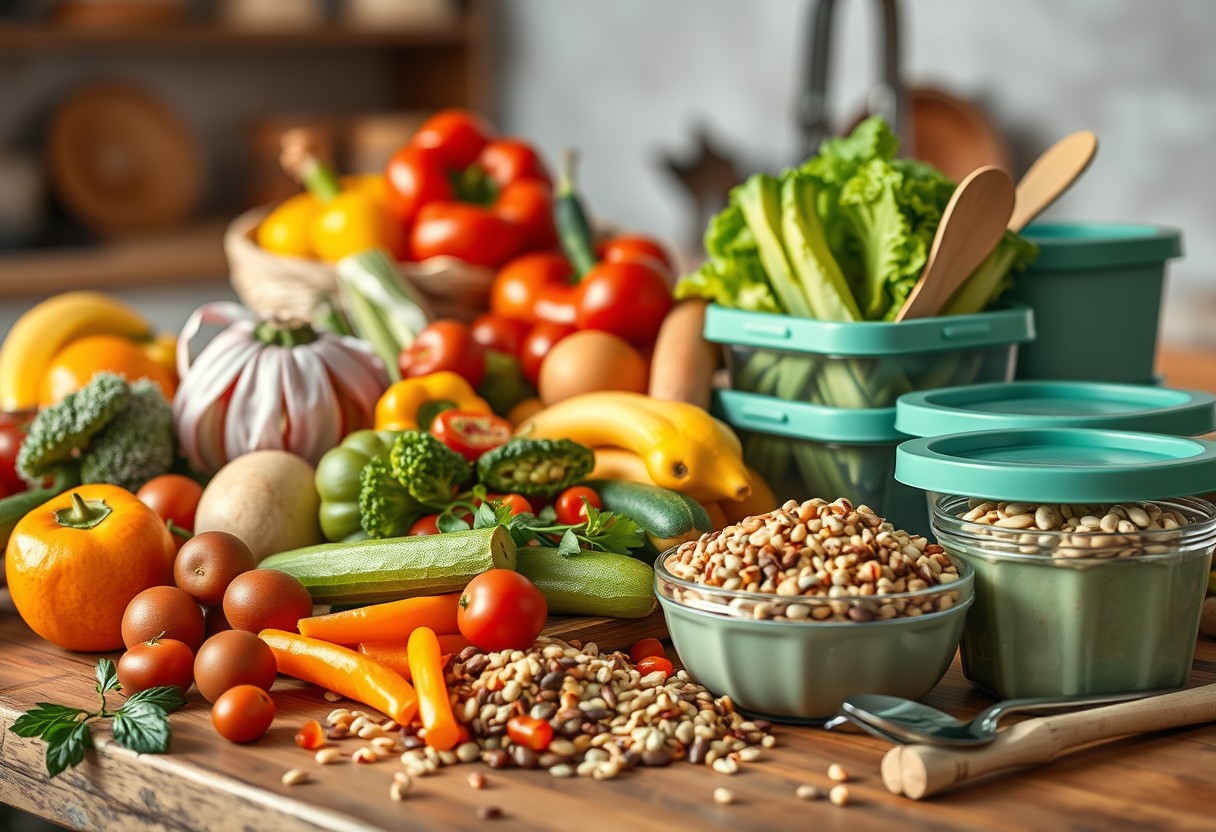It’s vital to adopt effective food waste solutions to not only enhance your kitchen routine but also contribute to a more sustainable lifestyle. By implementing practical strategies, you can significantly reduce waste, save money, and make the most of your ingredients. In this post, you’ll discover various tips and tools to help you manage food waste efficiently, turning your kitchen into an eco-friendly space that maximizes every morsel. Let’s explore how these vital solutions can transform your daily meal prep and planning.
Understanding Food Waste
A significant challenge in modern kitchens is food waste, which occurs at every stage of food production and consumption. Educating yourself on effective strategies to minimize waste can not only benefit your kitchen routine but also your budget. For insights and tips, you can explore Reduce Food Waste and Simplify Your Kitchen Routine ….
Causes of Food Waste in the Kitchen
Beside over-purchasing and poor meal planning, other common causes of kitchen waste include improper food storage, confusion about expiration dates, and lack of creativity in using leftovers. Being mindful of these issues can significantly enhance your kitchen efficiency.
Environmental Impact of Food Waste
Food waste contributes significantly to environmental degradation. When food decomposes in landfills, it produces methane, a greenhouse gas more potent than carbon dioxide. This not only exacerbates climate change but also strains resources used in food production, such as water and energy.
And it’s important to note that about one-third of all food produced globally is wasted, highlighting an immense opportunity for improvement. By understanding the link between food waste and your environmental footprint, you can take actionable steps toward reducing waste, which will ultimately benefit the planet and your community.
1. Embrace composting for organic kitchen waste reduction.
2. Implement meal planning to minimize excess food purchases.
3. Utilize food storage techniques to prolong freshness.
4. Repurpose leftovers creatively to minimize waste.
5. Donate excess food to local shelters or pantries.
6. Track food inventory to avoid overbuying and spoilage.

Effective Food Storage Solutions
Now, transforming your kitchen routine starts with effective food storage solutions. By organizing and storing your food correctly, you can prolong the freshness of ingredients, minimize waste, and save money. Utilizing appropriate containers, in the right places, not only maintains the quality of your food but also makes meal prep much smoother. Adopting these storage methods will help you enjoy ingredients to their fullest while embracing a sustainable kitchen approach.
Best Practices for Refrigeration
Among the best practices for refrigeration, it’s important to keep your fridge organized. Store items in clear containers, use labels, and place older ingredients at the front to prioritize their use. Adjusting the temperature to around 37°F (3°C) helps maintain freshness and keeps perishable items safe. Regularly check your fridge to toss expired products and keep an eye on foods that need to be consumed soon.
Vacuum Sealing Techniques
Effective vacuum sealing techniques can significantly enhance your food storage game. By removing air from bags and containers, you limit oxidation and bacterial growth, which extends the shelf life of your food. This method is ideal for preserving fruits, vegetables, and meats, ensuring their flavors and nutrients stay intact.
And one of the key benefits of vacuum sealing is the reduction in freezer burn, which often affects the texture and taste of frozen foods. To get started, simply purchase a vacuum sealer and compatible bags. Portion your food into desired amounts, seal them properly, and label with dates. You’ll find that meal prepping becomes easier and more waste-free, allowing you to enjoy your groceries longer while maintaining their freshness.

Meal Planning Strategies
Not only does effective meal planning reduce food waste, but it also streamlines your kitchen routine. By mapping out your meals for the week, you can create shopping lists that match the ingredients you need, minimizing impulse buys and unnecessary purchases. This thoughtful approach allows you to utilize what you have on hand, ensuring that your meals are both delicious and resourceful.
Creating a Weekly Meal Plan
Across your week, designing a meal plan can help you stay organized and make the most of your groceries. Start by assessing what ingredients you already have, then build your meals around them. By allocating specific meals for each day, you will reduce last-minute decisions that often lead to food waste.
Shopping with a Purpose
Beside planning your meals, consider shopping with a purpose to enhance efficiency. This means making a detailed grocery list based on your meal plan, which not only saves time but helps you avoid buying excess or redundant items.
Plus, by having a clear list that reflects your planned meals, you can focus on purchasing only what you need. This targeted approach not only ensures you stick to your budget but also prevents items from sitting unused in your pantry. When you know exactly what you need, you waste less, save money, and enjoy fresher food, leading to a more sustainable kitchen routine.
Composting as a Solution
For those looking to reduce kitchen waste, composting offers an effective and sustainable solution. By transforming food scraps and organic waste into nutrient-rich compost, you can minimize your impact on landfills while enriching your garden soil. This eco-friendly practice not only promotes environmental health but also allows you to take control of how you dispose of biodegradable materials in your kitchen.
Benefits of Composting
An effective composting routine can greatly enhance your kitchen and gardening practices. It reduces the volume of waste sent to landfills, which can significantly decrease greenhouse gas emissions. Additionally, compost enriches your soil, retains moisture, and suppresses plant diseases, leading to healthier plants and a more productive garden. By composting, you also promote biodiversity and contribute to a healthier ecosystem.
How to Start Composting at Home
Beside the environmental benefits, starting your own composting system at home is simple and rewarding. You can use a compost bin or even a designated corner of your yard. Begin by collecting kitchen scraps like vegetable peelings, coffee grounds, and eggshells. Layer these with yard waste such as leaves and grass clippings to create a balanced compost pile that decomposes effectively.
For instance, you can set up a compost bin in your backyard or utilize a kitchen compost bin for small spaces. Make sure to maintain a mix of “greens” (nitrogen-rich materials) and “browns” (carbon-rich materials) to achieve the best results. Turn the pile regularly to aerate it, and keep an eye on moisture levels. With a little patience, your compost will break down into a rich soil amendment that you can use to nourish your plants, completing the sustainable cycle in your kitchen routine.
Repurposing Leftovers
After a bustling week of cooking, it’s easy for leftovers to accumulate in your fridge. Instead of tossing out uneaten food, consider repurposing these meals into new and exciting creations that can elevate your kitchen routine. By transforming leftovers into fresh dishes, you not only reduce waste but also save time and money, allowing you to enjoy quick, delicious meals without the hassle of starting from scratch.
Creative Recipes for Leftovers
Repurposing your leftovers opens up a world of culinary creativity. You can turn last night’s roasted vegetables into a vibrant frittata or blend a few stale bread pieces into a savory bread pudding. Don’t hesitate to mix ingredients that might not initially seem compatible. With a little imagination, you can put a unique twist on meals, ensuring they are as enjoyable on day two as they were on day one.
Freezing and Preserving Extra Food
Leftovers can be a bounty of potential, especially when it comes to freezing and preserving extra food. By storing your surplus meals in airtight containers, you can easily keep them for future use, extending their lifespan and convenience. This practice not only helps maintain the quality of your ingredients but also allows you to enjoy home-cooked meals at your convenience, regardless of your schedule.
Preserving your food effectively requires attention to detail. Make sure to label each container with the contents and date to track freshness. Freezing can extend the life of meals for months, but it’s imperative to allow food to cool before sealing to prevent ice crystals from forming. By utilizing proper techniques, you can create a stockpile of delicious meals ready for those busy days when cooking from scratch isn’t an option.
Utilizing Technology
To effectively combat food waste in your kitchen, leveraging technology can simplify your routine and enhance your efficiency. Various digital tools and gadgets can assist you in tracking inventory, managing food usage, and even meal planning. By embracing these innovations, you not only reduce waste but also save time and money.
Apps for Food Management
About the various apps available for food management, these innovative tools can help you track expiration dates, create shopping lists, and suggest recipes based on the ingredients you have at home. Using these apps can streamline your cooking process, minimize waste, and enhance your culinary creativity.
Smart Kitchen Gadgets
To upgrade your kitchen experience, consider investing in smart kitchen gadgets designed to minimize food waste. From Bluetooth-enabled food scales to smart compost bins, these devices can accurately measure your ingredients and help you effectively dispose of waste, making your food preparation more efficient.
Food technology has made significant strides in recent years, offering you a range of tools to optimize your kitchen practices. Smart refrigerators can notify you when items are nearing expiration, while connected scales can help you measure portions precisely, reducing excess. Additionally, smart composters can quickly convert organic waste into nutrient-rich compost, giving your kitchen routine a sustainable edge. By integrating these gadgets into your kitchen, you enhance convenience and play a vital role in minimizing food waste.
Summing up
Now that you understand crucial food waste solutions, you can effectively transform your kitchen routine by planning meals, properly storing food, and utilizing leftovers creatively. Implementing these strategies will not only minimize waste but also enhance your cooking experience. For more insights, explore how to deal with food waste in your kitchen? Do you have tips for using up leftovers or reducing food waste? Your efforts can lead to a more sustainable lifestyle.



